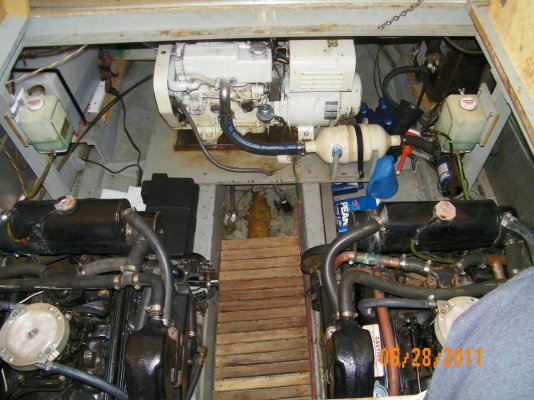I know gasoline engines have a reputation for not lasting as long as diesel, etc. But, I am still curious what type of reliability problem you are having?
My old Kohler (Diesel) was clearly of the same era, and hadn't been used for at least 5 years and maybe 10 years when I bought the boat. I primed it and adjusted the governor and a linkage rod to get the engine going, and it ran like a charm. I then replaced a resistor in the controller so it would stay going (it was part of a safety circuit). Then I cleaned out the cooling system and changed all of the fluids and filters and raw water impeller so I wouldn't make a mess of it with old stuff. Then I replaced a couple of other internal controller parts to fix the charging circuit (even though I never used it). And, I replaced the lifter pump, which a prior owner had supplemented with an electric pump. Eventually I tuned the governor and field resistor so the voltages and frequency were right across load levels. And, I then replaced the raw water and closed-loop cooling pumps (closed loop broke a shaft). I think I had the injectors rebuilt as part of a tune up, but don't remember. I never did the pump. Somewhere in there I also replaced the header cap and had the part where the water injection was welded into the exhaust pipe rewelded and wrapped the exhaust.
I had tried to get a Kohler dealer to work on it. But, basically they wouldn't. They'd all have been glad to give it a tune up or change fluids and filters or to swap a cooler or whatever. But, once there was a controller problem, they didn't want any part of it. Some said no. Some said that they were unlikely to be able to fix it, but would come out for $125/hr from the time they left their shop an hour away until they got back. And, one independent generator repair person looked at it, said nothing major was wrong, just something small in the controller. He was going to come back to fix it, but instead sent me the schematic via an SMS message and wished me luck. Mechanics would work on the engine, but not the generator back end.
...it took me hours and hours to learn how the generator works (I was new to boating, compounding my confusions). The folks in the legacy Kohler subforum at SmokStak (another forum specializing in such generators) were great.
Realistically, I went from a years-forgotten brick to a truly reliable generator for less than $1,000.00, most of that for the closed loop cooling pump.
One December I was at a mooring with a non-boating friend who loved creature comforts. That generator put out most of its capacity for days and its full capacity for an hour or so every evening when cooking.
For as old as it was, after I got the bugs worked out and built up some confidence with it a little at a time, I had no worries about it.
So, I guess I just want to encourage you to make sure you need a new generator before buying one. Personally, I've made errors both ways: Investing tons in things that needed replaced, and replacing things that should just have been repaired, calibrated, or used. One thing I've learned is that age, by itself, isn't a good prognosticator.




